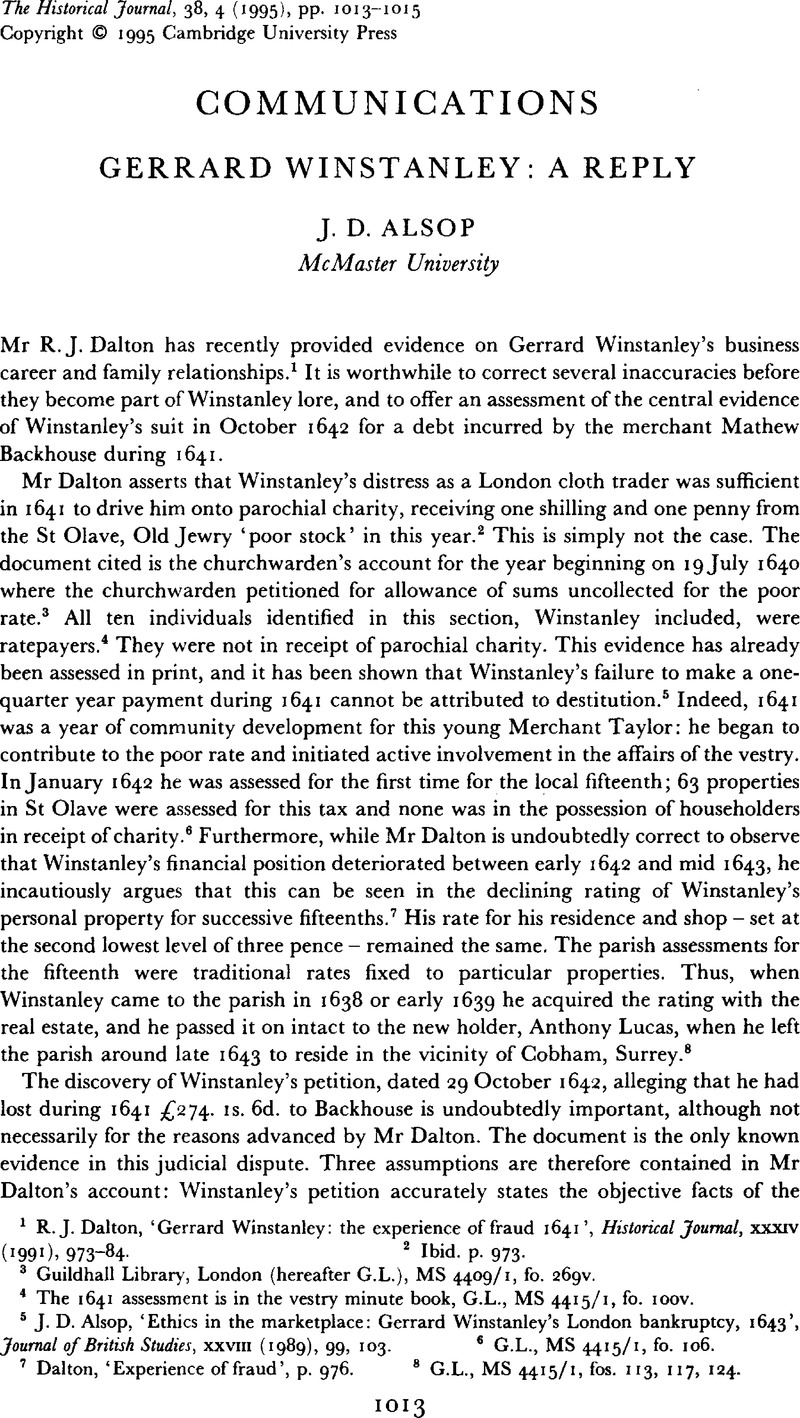Published online by Cambridge University Press: 11 February 2009

1 Dalton, R. J., ‘Gerrard Winstanley: the experience of fraud 1641’, Historical Journal, XXXIV (1991), 973–84.CrossRefGoogle Scholar
2 ibid. p. 973.
3 Guildhall Library, London (hereafter G.L.), MS 4409/1, fo. 269V.
4 The 1641 assessment is in the vestry minute book, G.L., MS 4415/1, fo. 100V.
5 Alsop, J. D., ‘Ethics in the marketplace: Gerrard Winstanley's London bankruptcy, 1643’, Journal of British Studies, XXVIII (1989), 99, 103.Google Scholar
6 G.L., MS 4415/1, fo. 106.
7 Dalton, , ‘Experience of fraud’, p. 976.Google Scholar
8 G.L., MS 4415/1, fos. 113, 117, 124.
9 Dalton, , ‘Experience of fraud’, pp. 973–5.Google Scholar
10 ibid. p. 981.
11 Alsop, , ‘Ethics in the marketplace’, pp. 105, 108, 113.Google Scholar
12 Gerrard, Winstanley, The new law of righteousness, in The works of Gerrard Winstanley, ed. Sabine, George H. (Ithaca, 1941), p. 188.Google Scholar
13 Mr Dalton's persistent references to ‘fraud’ and ‘fraudulent bonds’ are unhelpful, perhaps even misleading. None of the six merchants who entered depositions in this case, Winstanley included, made any comments concerning fraud or fraudulent bonds; their statements are straightforward allegations that Backhouse was indebted to each of them. It must be a deduction that Winstanley considered himself a victim of fraud in this case, and this deserves to be stated clearly. For Winstanley's assessments of the causes of his business failures: Alsop, , ‘Ethics in the marketplace’, pp. 105–9Google Scholar. Contrary to one statement, we have no reasons to believe that the death in December 1639 of the Wigan burgess presumed to be his father created financial difficulties for Winstanley and eventually led to his bankruptcy: Schulman, George M., Radicalism and reverence: the political thought of Gerrard Winstanley (Berkeley, 1989), p. 13Google Scholar. The relationship between Winstanley and that Edward Winstanley, including any connection through trade, is totally obscure.
14 Dalton, , ‘Experience of fraud’, p. 975.Google Scholar
15 Public Record Office, C 9/412/269. The statute referred to was 21 James I, c. 16.
16 Ibid.
17 Alsop, , ‘Ethics in the marketplace’, pp. 104–5, 109–12.Google Scholar
18 Dalton, , ‘Experience of fraud’, p. 975.Google Scholar
19 Alsop, , ‘Ethics in the marketplace’, pp. 103–4.Google Scholar
20 Ibid.
21 Gerrard, Winstanley, The saints paradise (London, n.d.; originally published in 1648, this edition was dated by Thomason July 1658 in Thomason Tracts, E 2131/1), pp. 57–8Google Scholar; Alsop, , ‘Ethics in the marketplace’, pp. 114–15.Google Scholar
22 Alsop, J. D., ‘The origin of a radical: Gerrard Winstanley, 1609–48’ (forthcoming).Google Scholar